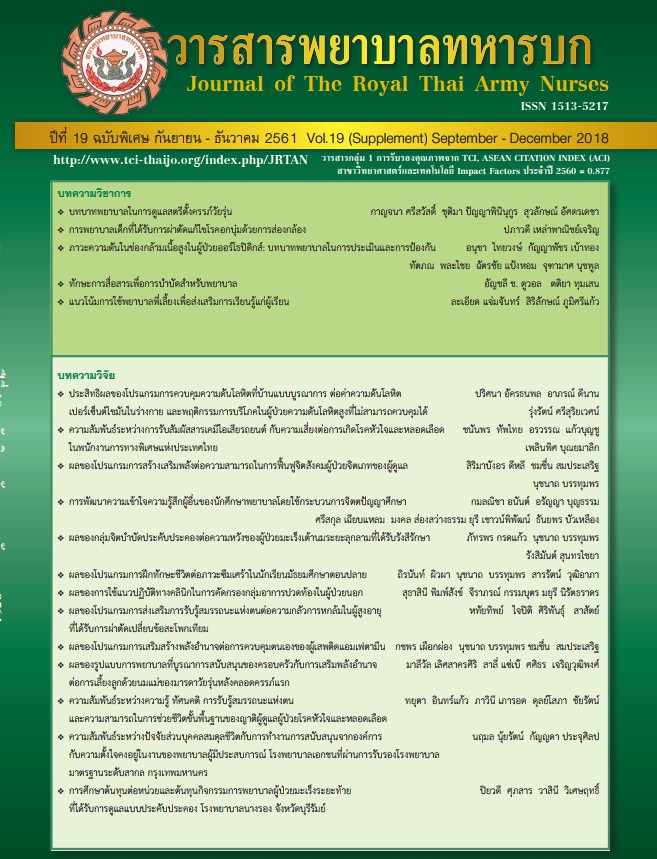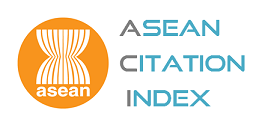ผลของโปรแกรมการสร้างเสริมพลังต่อความสามารถ ในการฟื้นฟูจิตสังคมผู้ป่วยจิตเภทของผู้ดูแล
คำสำคัญ:
การสร้างเสริมพลัง, ความสามารถในการฟื้นฟูจิตสังคมผู้ป่วยจิตเภท, ผู้ดูแลผู้ป่วยจิตเภทบทคัดย่อ
การวิจัยครั้งนี้เป็นการวิจัยกึ่งทดลอง แบบสองกลุ่มวัดสองครั้งก่อนและหลังการทดลองวัตถุประสงค ์ เพื่อศึกษาผลของ โปรแกรมการสร้างเสริมพลังต่อความสามารถในการฟื้นฟู สังคมผู้ป่วยจิตเภทของผู้ดูแล กลุ่มตัวอย่างคือ ผู้ดูแลผู้ป่วยจิตเภทที่อาศัย อยู่ในพื้นที่อำเภอห้วยทับทันจังหวัดศรีสะเกษ จำนวน 60 คน โดยการคัดเลือกกลุ่มตัวอย่างตามเกณฑ์ที่กำหนด แล้วสุ่มเข้า กลุ่ม ทดลอง จำนวน 30 คน และกลุ่มควบคุม จำนวน 30 คน โดยกลุ่มทดลองได้รับการดำเนิน กลุ่มการสร้างเสริมพลัง ส่วนกลุ่มควบคุม ได้รับการดูแลตามปกติ เครื่องมือที่ใช้ในการวิจัยคือ 1) แบบสอบถามข้อมูลส่วนบุคคล 2) โปรแกรมการสร้างเสริมพลัง 3) แบบวัด ความสามารถในการฟื้นฟูจิตสังคมผู้ป่วยจิตเภทของผู้ดูแล โปรแกรมการสร้างเสริมพลังได้ผ่านการตรวจสอบความตรง เชิงเนื้อหา จากผู้ทรงคุณวุฒิ จำนวน 3 ท่าน และแบบวัดความสามารถในการฟื้นฟูจิตสังคมผู้ป่วย จิตเภทของผู้ดูแล มีค่าความเที่ยงสัมประ สิทธ์อัลฟ่าครอนบาคเท่ากับ .98 วิเคราะห์ข้อมูล ส่วนบุคคลโดยใช้สถิติเชิงพรรณนาและทดสอบสมมติฐานด้วยสถิติทดสอบทีที่ไม่ เป็นอิสระต่อกัน และชนิดที่เป็นอิสระต่อกัน ผลการวิจัยพบว่า 1) ค่าเฉลี่ยคะแนนความสามารถในการฟื้นฟูจิตสังคมผู้ป่วยจิตเภทของผู้ดูแลหลังได้รับโปรแกรมการ สร้างเสริมพลัง (M = 102.50, SD = 6.06) สูงกว่าก่อนได้รับโปรแกรมการสร้างเสริมพลัง (M = 53.60, SD = 11.60) อย่างมีนัย สำคัญทางสถิติ (t = 20.68, p< .001) 2) ผลต่างของค่าเฉลี่ยคะแนนความสามารถในการฟื้นฟูจิตสังคมผู้ป่วยจิตเภทของผู้ดูแล ระหว่างก่อนและหลังเข้าร่วมโปรแกรมการสร้างเสริมพลังในกลุ่มทดลอง ( = 48.9, SD = 12.95) สูงกว่ากลุ่มควบคุมที่ได้รับการ ดูแลตามปกติ ( = 0.64, SD = 3.05) อย่างมีนัยสำคัญทางสถิติ (t = 19.87, p< .001) จากการศึกษาครั้งนี้ แสดงให้เห็นว่า โปรแกรมการสร้างเสริมพลังเพิ่มความสามารถในการฟื้นฟูจิตสังคมผู้ป่วยจิตเภทของ ผู้ดูแล จึงเป็นทางเลือกหนึ่งในการออกแบบกิจกรรมหรือโปรแกรมเพื่อสร้างเสริมความสามารถในการฟื้นฟูจิตสังคมผู้ป่วยจิตเภท ของผู้ดูแล
Downloads
เอกสารอ้างอิง
2. World Health Organization [WHO]. The World health report 2001: Mental health new understanding, new hope. 2016;
3. Norton, N., Williums, H.Y., & Owen, M.J. An update on the genetics of schizophrenia. Cunent Opinion in psychiatry. 2006; 19(1): 158-164.
4. Mental Health Department. Annual report department of mental health. information center planning division, Department of Mental Health, Ministry of Public Health, 2016. (in Thai).
5. Sukthong K., Uthis P., & Kertchok R. Effects of family group psychoeducation on burden and high expressed emotion in caregivers of schizophrenia patients in community. The Journal of Psychiatric Nursing and Mental Health. 2012; 26(3): 15-27. (in Thai).
6. Lim, C., Barrio, C., Hernandez, M., Barragán, A., & Brekke, J. S. Recovery from schizophrenia in community-based psychosocial rehabilitation settings.; 2017.
7. King, R., Lioyd, C., & Meehan, T. Handbook of Psychosocial Rehabilitation. Oxford: Blackwell; 2007.
8. Duangchan O., Khun Khok Choo P., & Kanjanicharangkul W. Social psychosocial practices in psychosocial clinics and kinematics of community hospitals.
Bangkok: Beyond .(in Thai).
9. Stanley S. & Shwetha,S.Integrated psychosocial intervention in schizophrenia: implications for patients and caregivers.International Journal of Psychosocial Rehabilitation. 2006; 10(2): 113-128.
10. Gibson, C. H. The process of empowerment in mothers of chronically ill children. Journal of Advanced Nursing.1995; 21(6): 1201-1210. doi: 10.1046/j.1365-2648.1995.21061201.
11. Neawbood S. Effects of empowerment program on self-care ability of a family caregiver. Journal of Nursing and Education. 2015; 8(4): 30-40. (in Thai).
12. Jaywan P., Nantachaipan P., & Thongchai C. Effects of the empowerment on perceived caring capabilities amonng caregivers of patients with traumatic brain injury. Nursing Journal. 2016; 43(1): 95-106. (in Thai).
13. Thanikkul B & Dangdomyouth P. The effects of self-help groups and empowerment of caregivers of schizophrenic patients in community. Journal of Psychiatry and Mental Health. 2012; 26 (2): 74-86. (in Thai).
14. Anantariyavej P., Jaiboon N., & Ploykluan W. The development of caregivers empowerment program of schizophrenia ptient with auditory hallucinations. The Journal of Psychiatric Nursing and Mental Health. 2013; 27(1): 97-107.
15. Panyasiri P., Sampalung J., Triripee S., & Chandaram W. Effect of empowerment program on caregiver capacity of vascular caregivers brain. Journal of Nursing, 2009; 36 (3): 47-57. (in Thai).
16. Boonmalic P. Development of life skills assessment for psychiatric rehabilitation [LSD 30]. Journal of Srithanya Hospital. 2012; (13): 3-29. (in Thai).
17. Leangpanich P., Somprasert C., & Imkome Ek. The effects of a peer support group program on psychosocial rehabilitation abilities in caregiver of schizophrenic patients. Journal of The Royal Thai Army Nurses. 2018; 19 (supplement): 214-223. (In Thai).
18. Chien, W., Norman, I., & Thompson, D. A randommized controlled trial of a mutual support group for family caregivers of patient with schizophrenia.
International Journal of Nursing Studies. 2004; 41(6): 637-649. doi:10.1016/j.ijnurstu. 2004.01.010
19. Saunders, JC. Families living with severe mental illness: a literature review. Issues in Mental Health Nursing. 2003; 24(2): 175-198. doi: 10.1080/01612840305301.
ดาวน์โหลด
เผยแพร่แล้ว
รูปแบบการอ้างอิง
ฉบับ
ประเภทบทความ
สัญญาอนุญาต
บทความหรือข้อคิดเห็นใดใดที่ปรากฏในวารสารพยาบาลทหารบกเป็นวรรณกรรมของผู้เขียน ซึ่งบรรณาธิการหรือสมาคมพยาบาลทหารบก ไม่จำเป็นต้องเห็นด้วย
บทความที่ได้รับการตีพิมพ์เป็นลิขสิทธิ์ของวารสารพยาบาลทหารบก
The ideas and opinions expressed in the Journal of The Royal Thai Army Nurses are those of the authors and not necessarily those
of the editor or Royal Thai Army Nurses Association.







